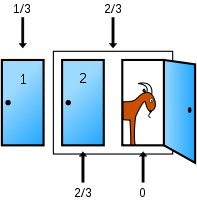The Monty Hall paradox is a well-known task of probability theory, the solution of which contradicts common sense and does not fit into the logical judgments of an average person. Knowledge of this paradox will be very useful for all players of bookmakers’ offices, will help to avoid mistakes in estimation of chances and will teach correct understanding of probability of occurrence of events.
The conditions of the Monty Hall paradox task
 The world first learned about this paradox through the American television game “Let’s Make a Deal”, hosted by Monty Hall. Actually, in honor of the presenter of this TV show and named this paradox. The Monty Hall paradox gained popularity after the publication of the problem of probability theory, which was the basis of the TV game, in one of the magazines. The conditions of this problem were as follows:
The world first learned about this paradox through the American television game “Let’s Make a Deal”, hosted by Monty Hall. Actually, in honor of the presenter of this TV show and named this paradox. The Monty Hall paradox gained popularity after the publication of the problem of probability theory, which was the basis of the TV game, in one of the magazines. The conditions of this problem were as follows:
Imagine that you became a participant of a TV show where you are offered to open one of the three doors to win a prize. The presenter informs you that behind one of these doors there is a car hiding, and behind the other two there is a consolation prize – a goat. You make your choice and point to, for example, door number 3. After that, the leader, who knows where the car is hidden, opens one of the other two doors, behind which there is a goat. Suppose this is door number 2 and asks you if you want to change your choice and open door number 1.
And the main question of the task is: should the participant accept the offer of the presenter and change the door? Will the chances of winning a car increase if you change your choice?
It should also be specified that manipulations are excluded and, accordingly, the organizers of the show can not change the prizes outside the door, everything is fair. At this point, you should not pay attention when considering this task.
Correct solution of the problem
What is the right thing to do – to stay on your initial choice, i.e. to open the door number 3, or to accept the presenter’s offer and change the choice by opening the door number 1? Most of the participants in this TV game did not change the door, trusting their intuition. Most people who are asked to do this also say that they will stand on their own and do not change their choice.
It would seem that nothing would change if the moderator’s proposal were accepted. Initially, the chances of winning the car were 33.3%. After the presenter opened one of the doors with a goat, the chances of winning the main prize became 50/50. So why choose the door number 1, the chances are the same.
In fact, people mistake that changing doors does not increase their chances of winning. In fact, participants who change their choice win twice as often as those who decide not to change their decision.
The main logical mistake is that people reevaluate the situation after the leader opens one of the doors and think that the chances of winning 50%. But that’s not true, your chances were originally 33.3%, and after one of the doors is open, the probability of getting a car is still the same 33.3%. But if you accept the presenter’s offer and change your choice, the chances of winning are 66.6%.
It can blow your mind. There is confidence that many readers will call this article and the paradox a delusion. But could thousands of mathematicians have made mistakes? The solution of the problem really contradicts intuition and common sense, but the truth is that the change of the initial choice doubles the chances of winning the car – from 33.3% to 66.6%.
In order to better understand the Monty Hall paradox, let’s combine the probability of two doors that were not chosen by the contestant. It turns out that the probability of finding the car behind the chosen door #3 is 33.3%, and the total probability of finding the car behind doors #1 and #2 is 66.6%. The anchor opens door #2 where the goat is hiding, so the probability of the car being behind this door is 0%. All 66.6 per cent are accounted for by door No. 1, which the driver proposes to open.
